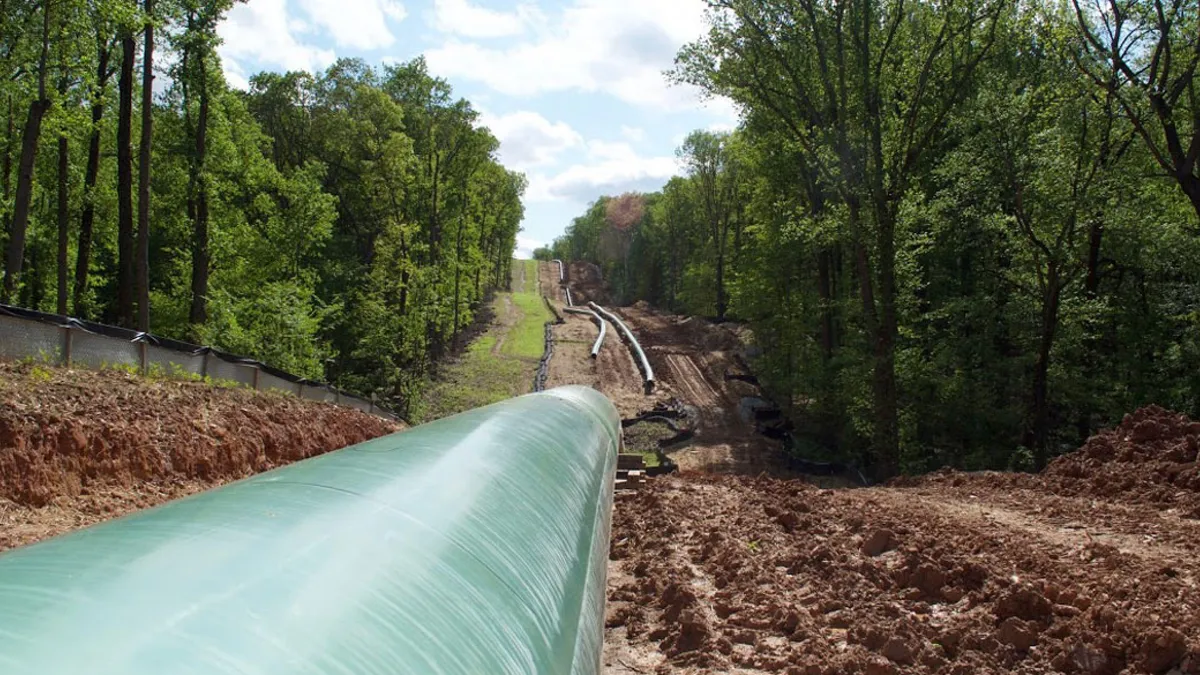Dive Brief:
-
One major Appalachian gas pipeline got approval to begin service this week as another was again stalled by a federal court.
-
On Thursday, the Federal Energy Regulatory Commission (FERC) authorized the 37-mile Atlantic Sunrise Pipeline to begin service in Pennsylvania. The decision came days after the 4th Circuit Court of Appeals halted construction on the 300-mile Mountain Valley Pipeline in West Virginia on Tuesday.
-
Both pipelines are the target of environmental protests and have been delayed by lawsuits throughout the construction process. FERC is currently reviewing its approval process for pipelines and presidential economic advisor Larry Kudlow said this week that the White House will make a new push to build more gas transport infrastructure.
Dive Insight:
The diverging fortunes of Atlantic Sunrise and Mountain Valley this week illustrate the struggle between environmental advocates and natural gas companies over the siting and construction of new pipelines.
On Tuesday, the 4th Circuit halted construction on Mountain Valley for the second time, ruling that the Army Corps of Engineers had instituted improper requirements for how the pipeline should cross streams in West Virginia. FERC had only allowed construction to restart on the pipeline last month.
West Virginia had imposed conditions that construction of stream crossings would take place over 72 hours, according to the court ruling, but the Army Corps attempted to overrule those requirements by saying the pipeline could be constructed with so-called "dry cut" methods that can take four to six weeks.
The Corps "lacked authority" to allow Mountain Valley to use its requirements in lieu of the state stipulations, the court said in an unsigned order. More details will be released in a subsequent opinion.
West Virginia officials are now rewriting the stream crossing rules to allow the pipeline to continue construction, ProPublica reports. Mountain Valley owners say they will reapply for permits once that is finished and don't expect the project to be significantly delayed.
In a separate case, FERC on Thursday sent a letter to the owners of the Atlantic Sunrise Pipeline, allowing it to begin service this weekend. Williams, which owns the 1.7 Bcf/day pipeline, has "adequately stabilized the areas disturbed by construction," FERC said, and "restoration is proceeding satisfactorily."
The new pipeline will help alleviate transportation bottlenecks coming out of the gas-rich production fields of Pennsylvania, owners say, but landowners and environmental activists have fought the project at every stage. In 2015, eight protestors pled guilty to trespassing charges after they tried to block the route of the pipeline.
FERC is currently reviewing its pipeline approval policy, but Republican control of the commission likely means it will opt for swifter permitting processes, rather than enhanced environmental reviews.
This week, President Trump nominated Department of Energy official Bernard McNamee to the only vacant seat on the five-member FERC, likely giving pipeline companies another ally if he is confirmed. Mike McKenna, who led Trump's DOE transition team and has known McNamee for decades, said he is likely to favor more gas infrastructure.
"He's going to be in favor of more infrastructure, more LNG export terminals, necessary pipelines," McKenna wrote in an email.













